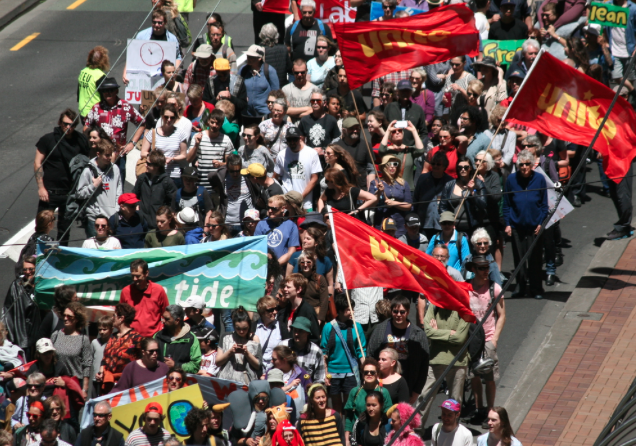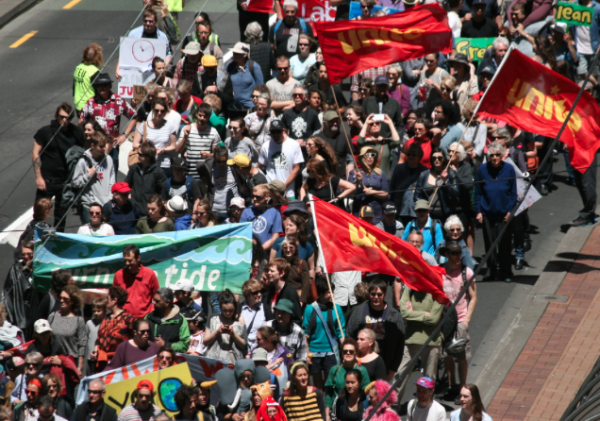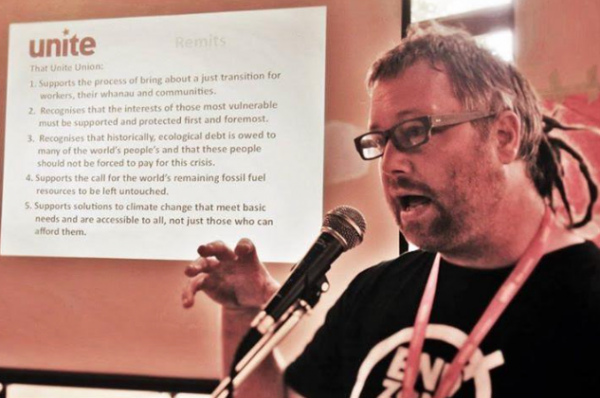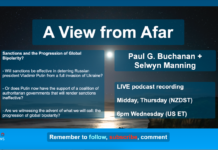Unite Union adopted a position on climate justice at its annual conference last week in Auckland. Many Unite members participated in the national protests for climate justice over the weekend.
The scientific, economic, social and environmental reasons for doing so were discussed by me in a blog two years ago. This was just prior to an international climate conference similar to this years Paris COP21 gathering. The title signifies the 21st Conference of the Parties.
The terror attacks in Paris has been used to ban public gatherings and French police pre-emptively arrested and detained hundreds of climate activists. As a consequence the democratic input from civil society will be drastically curtailed.
I argued that capitalism was an enemy of mother earth and working people and that system change was a precondition for effective action against climate change. I pointed out that little had been done by the rulers of all the wealthy capitalist countries because they were servants of the system creating the problem.
Little has changed the last few years except for the evidence of global warming and associated catastrophes becoming clearer than ever before.
Our own Prime Minister John Key unapologetically says New Zealand “doesn’t need to be and shouldn’t be a leader in climate change”. He was awarded a “Fossil of the Day” award by Climate Action Network International for the stupidity of his contribution to the conference.
Unite Organiser Gary Cranston will also be attending the climate change negotiations in Paris this week and next as part of an international union delegation.
The remit to officially adopt a climate justice policy was put forward at Unite Union’s annual conference which wrapped up Friday last week. Unite organiser and now climate justice spokesperson Gary Cranston put the remit to delegates who voted overwhelmingly to adopt it. Gary is travelling to the international UN climate change negotiations in Paris with official observer status with the International Trade Union Confederation (ITUC).
Unite organiser Gary Cranston introduces resolution on climate justice to Unite annual conference November 27, 2015
The ITUC recently put a similar set of demands to the French President François Hollande ahead of the global climate summit, demanding a just (fair) transition for all workers to a low carbon and more socially equitable economy. The need to ensure that this transition puts the needs of the world’s most vulnerable people first and foremost was a key inclusion.
Unite union represents an incredibly diverse range of people from all sorts of backgrounds. We have many members from low-lying Pacific island nations threatened by rising sea levels. We have members from the Philippines whose homelands are being smashed by typhoons on a regular basis. We have of course lots of members who identify as Tangata Whenua, whose land and sea are being opened up for deep sea oil drilling and fracking here in Aotearoa. Many of our members are the world’s least responsible for causing climate change yet are the ones who are being impacted the most.
Beyond the more obvious connections with the issue, by developing and adopting this policy Unite Union is recognising that it is low-income earners who are the least resilient to economic, energy and weather-related shocks that are coming down the line. As do union members and activists in other parts of the globe such as the Fight for $15 movement in the U.S. who marched in New York this year alongside climate justice activists drawing connections between sustainable ecological and economic practices chanting “living wage and a livable planet”.
We hope to see more of New Zealand’s unions developing positions on climate change, particularly unions representing workers in extractive industries like coal mining and petroleum processing. This way these workers can have a voice in this inevitable transition that is coming with the needs of their families and communities front and centre.
Unite union stands with all these workers and everyone on the front line of both environmental and workplace injustice in calling for a just transition to a sustainable and more economically and politically equitable world. At the end of the day, this all part of the same struggle.
Audio: Interview with McDonald’s Unite delegate Alvina Shortland on the climate justice resolution
Audio: Interview with McDonald’s Unite delegate Tina Amiri on the climate justice resolution
Gary will be updating us at www.unite.org.nz/unite_news and www.climatejusticeaotearoa.org
Gary will be interviewing and writing on happenings both inside and outside of the conference centre and can be contacted at gary@unite.org.nz for comment and media interest while attending the conference








Climate Scientists laugh at Global warming Hysteria
https://www.youtube.com/watch?v=C35pasCr6KI
The bigger problem we should be focusing on is over population.
That should be “overpopulation”
Do the different sides in this argument about climate change ever step back and consider they may be wrong? I believe more and more people are becoming increasingly sceptical about this so called global warming and sea level rise, now described as climate change, (because they’re not quite sure what’s going on?) but it’s still science eh!
According to what I’ve read I don’t believe sea level rise is happening, others disagree. Nils-Axel Mörner made a film of his findings, over decades of observation and measurement of sea levels in the Maldives, but the Maldives government don’t want to show it on public TV. I wonder why not?
Do any of the climate change believers or deniers look at the videos or explore the opposing views on climate change and sea level rise?
First these “Scientists” tell us we are heading for a new ice age, then they distort the evidence, then it’s people “won’t see snow in the winter anymore” How can they expect to be taken seriously? Sorry that isn’t Science its just speculation.
The drop in temperatures that occurred from the 1940s to the 1970s was due to Global Dimming, whereby so much ‘crap’ had been put into the atmosphere via industrial pollution it actually reduced the amount of sunlight reaching the surface. The air quality got so bad in the most industrialised nations the powers that be were forced to take action and curb the most smoky emissions…..resulting in slightly clearer skies and temperatures heading on upwards, as they had been prior to the massive particulate phenomenon. We have now reached the point where climate forcing due to greenhouse gases overwhelms the Global Dimming aspect by a huge margin. Hence, 2015 has been the hottest year ever, and 2016 is expected to be even hotter. How could it not be now that the CO2 concentration has been increased more than 120ppm above baseline.
Never let actual science get in the way of an ideological argument or manipulation of society by vested interests, eh?
By the way, increased precipitation as snow is usually indicative of higher temperatures, not lower temperatures, which is counter-intuitive for people who know no science. No surprise that faux argument gets hauled out and over and over again.
Sure, total global population is a ‘problem’ but don’t forget the mollycoddled 20% of the global population who live in ‘developed nations’ are responsible for 80% of global problems as a direct consequence of their overconsumption.
The problem is so bad now you can see sea levels rising
‘I argued that capitalism was an enemy of mother earth and working people and that system change was a precondition for effective action against climate change. I pointed out that little had been done by the rulers of all the wealthy capitalist countries because they were servants of the system creating the problem.’
Absolutely right! Governments and bureaucrats strive to prevent movement towards justice and sustainability.
“Until you change the way the financial system works, you change nothing.”
And those who benefit from present arrangements will ensure no change occurs.
First it was climate warming, then it was amended to climate change and now it’s climate justice? I appreciate your attempt to depict a complex systems approach involving fairness and justice for all, but in fact you are positing a universal theory that is too simplistic in its nature and doesn’t reflect the complexity of the real world. It will turn off more people than it will engage.
I just wonder how many actually follow the video links, and watch the videos before disagreeing? Did you?
Comments are closed.